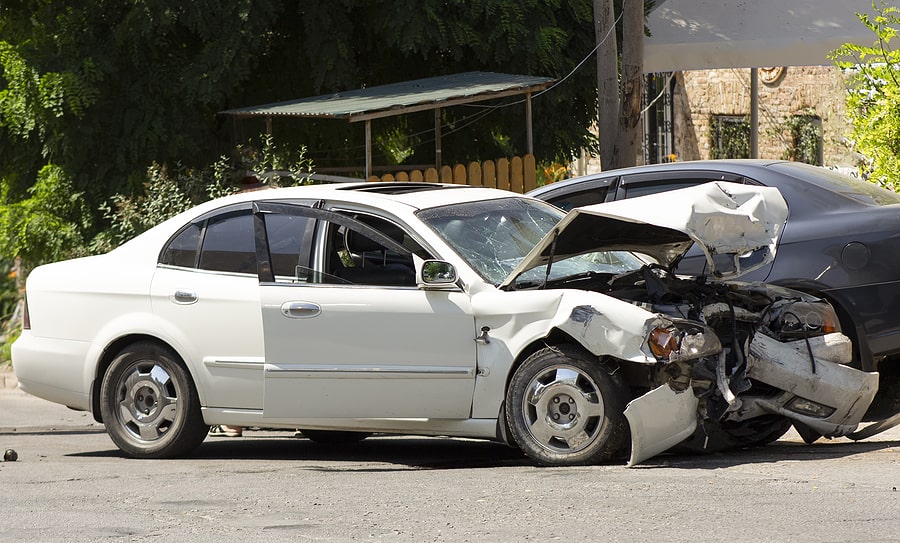Following a car accident that resulted from someone else's negligence, you can file a personal injury lawsuit seeking various forms of monetary recovery. Lawsuits and litigation are typically necessary if the at-fault party's insurance company denies fault for your accident or if they do not offer you sufficient monetary compensation for your injuries and losses.
Your car accident attorney can take the appropriate legal steps on your behalf and pursue the maximum monetary compensation available for your accident-related losses. With a comprehensive understanding of personal injury laws, they will navigate the complexities of your case, assess all relevant factors, and strive to ensure that you receive financial recovery and the justice and support you deserve during this challenging time.
Types of Car Accidents That Result from Others' Negligence
Car accidents resulting from the negligence of other drivers can take various forms, each with its own set of consequences. The following are types of car accidents commonly caused by negligent drivers:

- Rear-end Collisions occur when a driver fails to maintain a safe following distance and collides with the vehicle in front of them. Inattentiveness, distracted driving, speeding, or suddenly slowing down are common causes.
- Head-on Collisions — Typically, the most severe head-on collisions happen when two vehicles traveling in opposite directions collide. This can result from wrong-way driving, overtaking other vehicles in no-passing zones, or drifting into oncoming traffic due to fatigue or inattentiveness.
- T-bone (Side Impact) Collisions — Also known as intersection or broadside
Collisions occur when the front of one vehicle hits the side of another vehicle.
- Rollover Accidents — High-speed collisions, abrupt maneuvers, or collisions with certain vehicles can lead to a vehicle's rolling over. Larger vehicles like commercial trucks, big rigs, 18-wheelers, and SUVs may be more prone to rollovers.
- Sideswipe Collisions — These accidents occur when the sides of two vehicles traveling parallel make contact. Sideswipes may happen during lane changes or merging.
- Drowsy Driving Accidents — Fatigued driving impairs a driver's reaction time and attention, increasing the risk of accidents. Falling asleep at the wheel or experiencing microsleep can have severe consequences.
- Speeding Accidents — Driving at speeds exceeding posted limits or too fast for road conditions reduces reaction time and increases the severity of collisions. Speeding is a common component in various types of motor vehicle accidents.
- Failure to Signal or Yield — Accidents often occur when drivers fail to yield the right-of-way, use turn signals at the proper times, or obey traffic lights and signs.
- Drunk Driving Accidents — Operating a vehicle under the influence of alcohol or drugs impairs judgment and muscular coordination. Drunk driving often leads to violent accidents with severe consequences.
- Distracted Driving Accidents — Distractions such as texting, listening to loud music, talking on the phone, or adjusting in-car navigation systems divert a driver's attention, leading to accidents. Distracted driving is a significant contributor to both rear-end and sideswipe accidents.
Understanding the types of car accidents resulting from negligent driving is crucial for road safety. Following standard traffic laws, avoiding risky behaviors, and staying attentive can help prevent these accidents and protect drivers and passengers.
Common Car Crash Injuries
Car accident victims who experience crashes due to someone else's negligence can suffer a range of injuries, varying in severity. The force of the collision, vehicle speed, and safety measures play significant roles in determining the nature and extent of these injuries. Here are some of the most common injuries that car accident victims may suffer:
- Whiplash
- Bone fractures
- Traumatic brain injuries (TBIs) or concussions
- Spinal cord injuries
- Soft tissue injuries, including muscular sprains and strains
- Internal injuries, including bleeding and organ damage
- Chest injuries
- Crush injuries
- Knee and leg injuries
- Burns
In addition to the physical injuries that individuals may suffer, car crash victims may also experience intense psychological injuries, including post-traumatic stress disorder. Individuals who suffer from PTSD often experience ongoing mental anguish and emotional distress. They may also develop a fear of operating a car, riding in a car, or driving near the location where the car accident happened.
Car accident victims must seek prompt medical attention to quickly assess and address their injuries. Documenting injuries, following all prescribed treatment plans, and consulting with legal professionals can help accident victims pursue compensation for damages resulting from injuries caused by someone else's negligence.
Deciding Whether to Settle or Litigate a Car Accident Case
Deciding whether to settle or litigate a car accident case is a crucial decision that requires careful consideration of various factors. Both settlement and litigation have pros and cons, and the choice depends on the case's specific circumstances.
Settling a car accident case involves reaching an agreement with the opposing party, usually through negotiations facilitated by attorneys. One significant advantage of settling is the potential for a quicker resolution. It can spare the parties involved from a lengthy legal process and emotional stress. Additionally, settlements are often less expensive than litigation as they avoid the high costs of court fees and lengthy legal proceedings.
On the other hand, settling may mean accepting a compromise on the compensation amount. Remember to carefully assess whether the proposed settlement adequately covers medical expenses, property damage, lost income, and other damages resulting from the accident. If the settlement offer is insufficient, pursuing litigation might be necessary to seek fair compensation.
Litigating a car accident case involves taking the matter to court, where a judge or jury will decide the outcome. This option is appropriate when negotiations break down and there is a need for a third party to adjudicate. Litigation allows for a more thorough examination of evidence and can result in a more precise determination of fault and liability.
However, litigation is a time-consuming and costly process. A final resolution may take months or even years to reach. The associated legal fees, court costs, and potential for appeals can significantly increase the financial burden on both parties. Moreover, the outcome in court is uncertain, as it depends on the evidence presented and the legal arguments made.
Ultimately, a careful evaluation of the specific circumstances should be the basis for deciding whether to settle or litigate, including the extent of injuries, available evidence, and the willingness of both parties to negotiate. Consulting with an experienced attorney can provide valuable guidance in making an informed decision that aligns with the best interests of all parties involved in the car accident case.
Litigating a Car Accident Case in the Court System
Car accident litigation in the state court system – or filing a lawsuit – involves a series of legal proceedings to resolve disputes arising from a car accident. The process typically unfolds in several stages, each serving a specific purpose within the legal framework of the state court.

- Filing a Complaint — The litigation process begins with the injured party, the plaintiff, filing a complaint against the at-fault party, referred to as the defendant. The complaint outlines the legal basis for the lawsuit, detailing the alleged negligence or misconduct that led to the car accident and the resulting injuries and damages.
- Serving of Process — After filing the complaint, the plaintiff must ensure that the defendant receives prompt notice of the lawsuit. Achieving this step involves a legal process known as "service of process," wherein the defendant officially receives notification of the legal action against them.
- Answer and Discovery — The defendant responds to the complaint by filing an answer, addressing the allegations made by the plaintiff. Following this step, both parties engage in the discovery phase, exchanging relevant information, documents, and evidence. Discovery may involve interrogatories, depositions, and requests to produce documents.
- Pretrial Motions — Either party can file pretrial motions to address specific legal issues before the case proceeds to trial. These motions may seek to dismiss certain portions of the claim, exclude evidence, or resolve legal issues that can affect the trial proceedings.
- Negotiations and Settlement Attempts —Parties may engage in negotiations and settlement discussions throughout the litigation process. Courts often encourage settlement to alleviate their caseloads and provide a quicker resolution for the involved parties.
Trial — If the parties cannot settle, they proceed to trial. During the trial, both parties present their evidence, witnesses testify, and the lawyers make closing arguments. A judge or jury then evaluates the evidence, determines liability, and assesses damages if they find the defendant at fault.
- Judgment and Appeals — The court issues a judgment outlining the decision after the trial. Either party may appeal the judgment if they believe legal errors occurred during the trial. The appellate court reviews the case to determine if any legal mistakes warrant a reversal or modification of the judgment.
- Enforcement and Judgment — If the judgment stands, the prevailing party may need to take steps to enforce the judgment and collect the awarded damages from the losing party. This may involve garnishing income or seizing assets as permitted by law.
Car accident litigation in the state court system is a comprehensive legal process designed to fairly adjudicate disputes arising from car accidents while ensuring due process and adherence to the applicable laws and regulations.
Recovering Compensation for Your Financial Losses
When an individual sustains injuries in a car accident due to negligence, they may be entitled to various monetary damages to compensate for the harm. These damages aim to address the financial and non-economic losses resulting from the accident. The primary types of monetary damages that an accident victim may receive are as follows:
- Medical Expenses — Accident victims can seek compensation for the medical costs incurred due to the injuries sustained. This includes hospital bills, surgery expenses, prescription medications, and rehabilitation. Future medical expenses anticipated because of the injuries may also be recoverable in the damages awarded.
- Lost Income and Earning Capacity — If the injuries prevent the victim from working, they can claim compensation for lost income. This encompasses the income they lost during their recovery period. Additionally, if the injuries have a long-term effect on the victim's ability to earn a living, damages may be available to compensate for this diminished earning capacity.
- Property Damage — Compensation for damage to the victim's vehicle or other property as a direct result of the accident is a recoverable cost. This includes repair or replacement costs for the damaged vehicle and any other personal property that suffered harm in the collision.
- Pain and Suffering — Non-economic damages, such as pain and suffering, aim to compensate the victim for the physical and emotional distress caused by the accident and subsequent injuries. This category is subjective and may consider factors like the intensity and duration of pain, emotional anguish, and the effect on the accident victim's overall quality of life.
- Loss of Consortium — In some cases, spouses or family members of the injured party may be eligible for damages due to the loss of consortium or companionship. This recognizes the injuries' negative effect on the accident victim's relationships and family dynamics.
- Punitive Damages — Punitive damages may be available when the defendant's conduct is deemed particularly egregious or malicious. Unlike compensatory damages, which aim to reimburse the injured accident victim, punitive damages are necessary to punish the wrongdoer and deter similar future conduct.
Understanding these monetary damages is crucial for accident victims seeking fair compensation. Consulting with a knowledgeable personal injury attorney can help navigate the complexities of calculating damages and presenting a comprehensive case to ensure that the victim receives appropriate compensation for the losses they incurred due to the car accident and resulting injuries.
Call a Car Accident Lawyer in Your Area Right Away
If you suffered injuries in a local car crash, time is of the essence. In most situations, accident victims must file a lawsuit within two years of their car accident date. Otherwise, they run the risk of missing the statute of limitations deadline.
An experienced personal injury attorney can guide you in determining whether to accept a settlement offer in your case or proceed with litigation in the court system. Whatever you decide, your attorney will aggressively represent your legal interests and pursue the full monetary compensation you deserve to recover for your injuries. Act now to have the best chance of full compensation.

